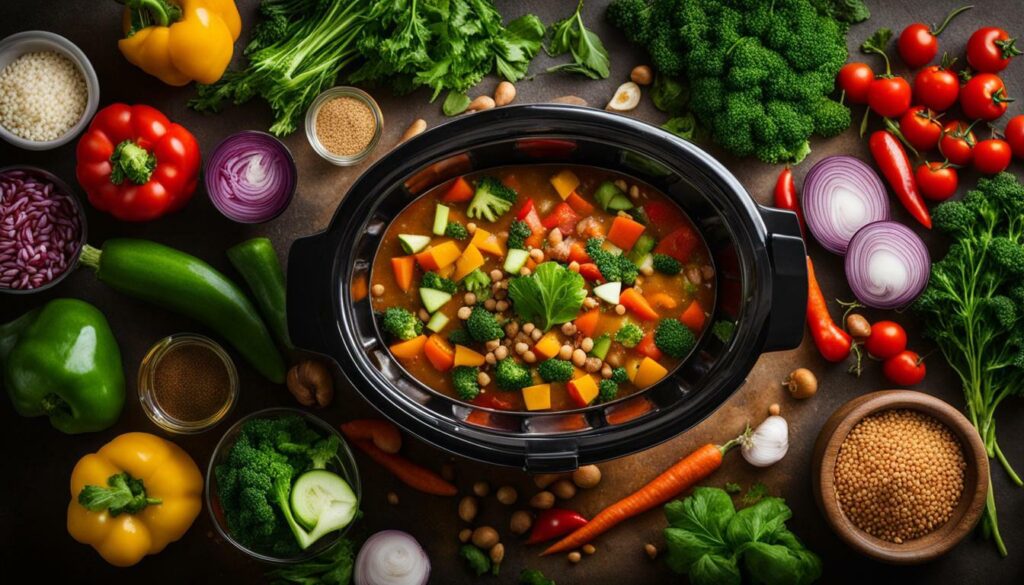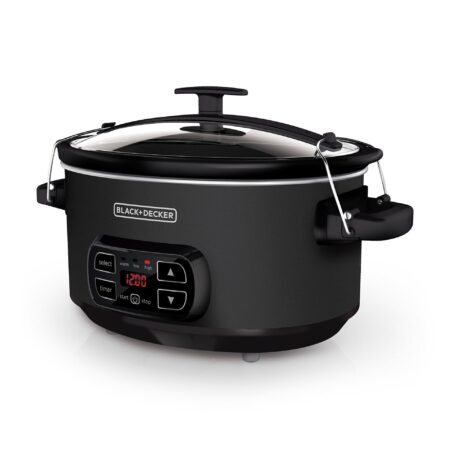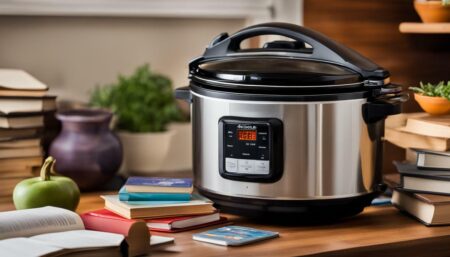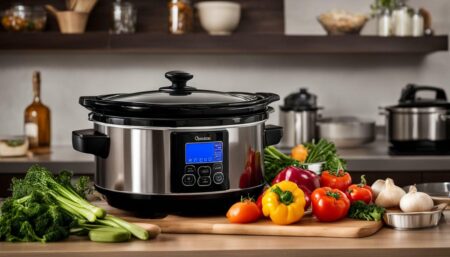Cooking with a small slow cooker offers numerous health benefits that can improve your overall well-being. Slow cooking is a popular cooking method that allows food to cook at a low temperature for an extended period, resulting in tender, flavorful dishes that retain more nutrients than other cooking methods.
Using a small slow cooker to prepare your meals saves you time and energy while creating nourishing and delicious dishes that support your healthy lifestyle. From the health benefits of slow cooking to the time-saving convenience it offers, discover why incorporating small slow cookers into your kitchen can benefit your overall health.
Key Takeaways
- Using a small slow cooker can enhance the nutritional value of your meals.
- Slow cooking can save you time and energy in the kitchen.
- Slow cookers are versatile appliances that can expand your culinary repertoire.
- Slow cooking can support weight loss goals by creating flavorful meals with fewer added fats and oils.
- Slow cooking is an energy-efficient cooking method that can help reduce your carbon footprint and save on utility bills.
Enhance Nutrition with Slow Cooking
Slow cooking is a cooking method that preserves the nutrient content of food better than other cooking methods. This makes it an ideal option for those who want to ensure their meals are nutritious and healthy.
The slow cooking process takes longer than other cooking methods, such as frying or boiling, but this is due to the low and consistent heat that slow cookers use. This low heat helps to break down tough meat fibers, making it easier to digest and absorb the nutrients.
Additionally, slow cooking helps to retain water-soluble vitamins, such as vitamin C and B vitamins, which are typically lost during other cooking methods. These vitamins are crucial for a healthy immune system, metabolism, and energy production.
Slow cooking also helps to preserve the flavor of food, which means that less salt or seasoning is needed, making it a healthier option for those looking to reduce their sodium intake.
Overall, slow cooking is an excellent way to enhance the nutritional value of your meals and ensure that you are getting all of the essential vitamins and minerals your body needs.
Enhance Nutrition with Slow Cooking: Tips and Tricks
To optimize the nutritional benefits of your slow-cooked meals, try incorporating the following tips into your cooking routine:
- Choose fresh fruits and vegetables and avoid canned goods, which can be high in sodium and preservatives.
- Trim excess fat from meats before cooking to reduce the calorie and fat content of your meals.
- Use herbs and spices to add flavor instead of salt or sugar.
- Use lean cuts of meat, such as chicken or turkey breast, for a healthier protein source.
By following these tips and incorporating slow cooking into your meal planning, you can enjoy delicious and nutritious meals without sacrificing flavor or convenience.
Save Time with a Small Slow Cooker
Busy individuals often struggle to find the time to prepare nutritious meals. Fortunately, using a small slow cooker can help streamline the cooking process and save you valuable time.
One of the main advantages of a slow cooker is the ability to set it and forget it. Once you’ve added your ingredients and set the desired temperature, you can leave your slow cooker to work its magic while you attend to other tasks. This means you can come back to a delicious, perfectly cooked meal without having to monitor it constantly.
Using a small slow cooker is particularly beneficial for busy individuals who are short on counter space. These compact appliances take up minimal space and can be easily stored away when not in use.
Another advantage of slow cooking is the ability to prepare meals in large quantities. This means you can cook once and enjoy multiple meals throughout the week, saving you time and effort in the long run.
Whether you’re a busy parent, a working professional, or simply someone who values their time, incorporating a slow cooker into your kitchen arsenal can be a game-changer. Take advantage of the time-saving benefits and enjoy delicious, nutritious meals with minimal effort.
Enjoy Hearty and Nourishing Meals
When it comes to preparing satisfying meals, using a small slow cooker can elevate your meal planning. Slow cooking allows for the creation of hearty and nourishing meals that are perfect for cold days or when you want a comforting dish. With a slow cooker, you can easily prepare soups, stews, and chili that are packed with nutrients and flavor.
The benefits of using a slow cooker for meal planning are numerous. Not only can you save time by preparing meals in advance, but you can also ensure that your meals are nutritious and filling. Slow cooking allows for the use of cheaper cuts of meat, which can be tenderized through the low and slow cooking process. This means that you can enjoy delicious and budget-friendly meals that are still packed with protein and other important nutrients.
One of the greatest advantages of using a small slow cooker for meal planning is the flexibility it offers. Whether you’re cooking for a large family or just yourself, slow cookers come in a range of sizes to suit your needs. You can easily adjust the serving sizes to ensure that you have enough for leftovers, saving you time and money throughout the week.
When creating meals in a slow cooker, you can also get creative with your ingredients. Slow cooking is a forgiving method of cooking, and you can include a variety of vegetables and spices to create unique and flavorful dishes. From vegetarian chili to beef stew with root vegetables, the possibilities are endless.
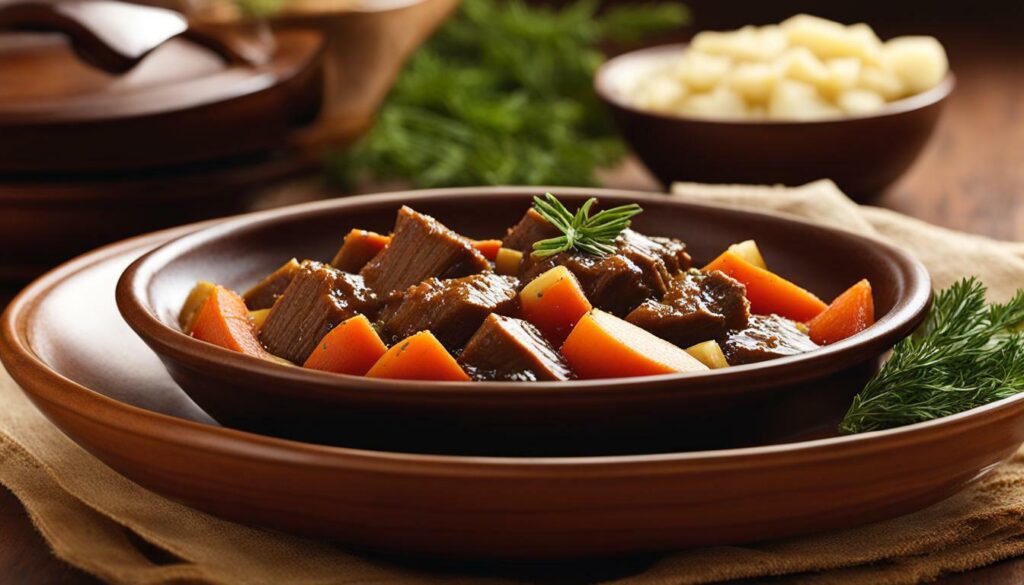
Overall, the benefits of using a slow cooker for meal planning are clear. Not only can you save time and money, but you can also enjoy nutritious and satisfying meals that are perfect for any occasion. So why not dust off your slow cooker and start experimenting with some delicious and comforting dishes today?
Slow Cooker Benefits for Weight Loss
If you’re looking to shed some extra pounds, using a small slow cooker can be a valuable tool in your weight loss journey. Slow cooking allows for meals that are full of flavor without added fats or oils, making it an ideal method for healthy eating. In fact, using a slow cooker can help you reduce your calorie intake while still providing satisfying and nutritious meals.
One of the biggest benefits of slow cooking for weight loss is portion control. Slow cookers come in different sizes, and using a small one can help you control your portion sizes better. Plus, slow cooking allows you to use less meat while still creating a filling meal, especially when you include plenty of vegetables.
Another way slow cooking can support weight loss is by reducing your overall food intake. Since slow-cooked meals are typically more filling, you may find yourself eating less throughout the day. Plus, the time-saving aspect of slow cooking can also help you avoid unhealthy fast food options.
But keep in mind that even when using a slow cooker, it’s important to choose healthy ingredients and limit added salt and sugar. By combining a healthy diet with the many benefits of using a small slow cooker, you’ll be on your way to achieving your weight loss goals and enjoying delicious meals in the process.
Energy Efficiency of Slow Cookers
Aside from being a convenient and healthy cooking method, slow cookers are also known for their energy efficiency. Compared to traditional stovetop or oven cooking methods that require more energy and generate more heat, slow cookers use a minimal amount of electricity to cook food over a longer period of time. This makes them an eco-friendly choice for any home cook looking to reduce their carbon footprint and save on utility bills.
Not only do slow cookers use less energy overall, but they also help reduce the load on your home’s air conditioning system by producing less heat while cooking. This can be especially helpful during the hot summer months when running the oven can cause your home to feel even warmer.
The energy efficiency of slow cookers is due in part to their design: a tightly sealed lid and a low, steady cooking temperature that allows for even heat distribution. This means that less heat is wasted during the cooking process, resulting in less energy consumption overall.
Using a small slow cooker is not only good for the environment but also for your wallet. By reducing energy consumption, slow cookers can help you save money on electricity bills. Plus, slow-cooked meals often use more affordable, tougher cuts of meat that benefit from longer cooking times. This means that slow cooking can help you make the most out of your ingredients, while also saving you money in the process.
So, whether you’re looking to save money, reduce your carbon footprint, or simply enjoy healthier meals, a small slow cooker is an excellent addition to any kitchen.
Slow Cooker Energy Efficiency Tips
To maximize the energy efficiency of your slow cooker, follow these simple tips:
- Choose a slow cooker with a timer so you can avoid overcooking and wasting energy.
- Use the smallest slow cooker possible for your needs, as larger models use more energy overall.
- Avoid opening the lid frequently while cooking, as this can cause heat to escape and increase cooking time.
- If using frozen ingredients, thaw them before adding them to the slow cooker. This will help reduce cooking time and energy consumption.
- Plan ahead and batch-cook meals to avoid using the slow cooker too often throughout the week.
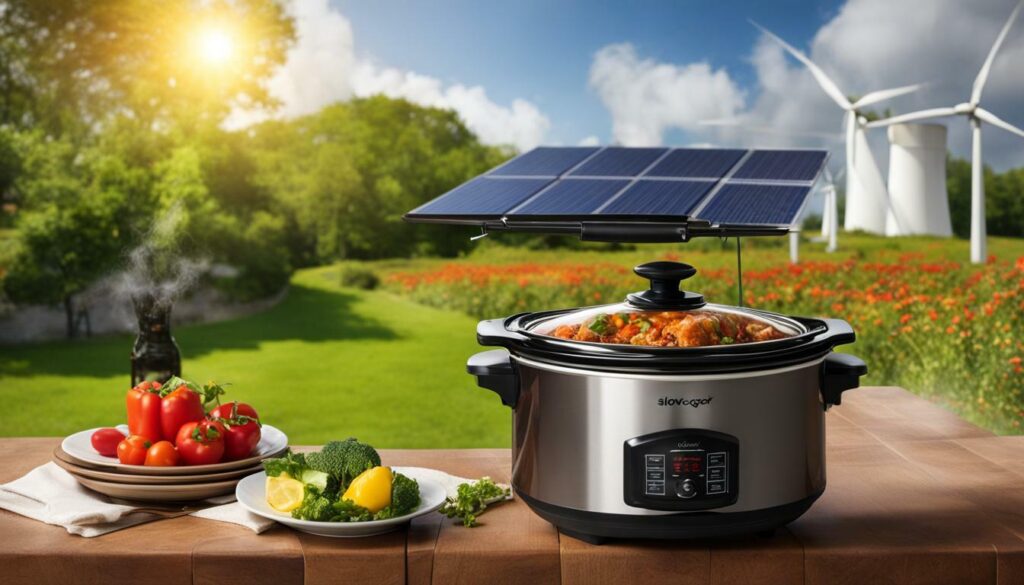
Tips for Maximizing Slow Cooker Health Benefits
Slow cooking is an excellent way to boost the nutritional value of your meals, save time, and enjoy delicious, homemade dishes with minimal effort. Here are some tips to help you get the most out of your slow cooker:
1. Choose the Right Ingredients
Using fresh and healthy ingredients is crucial for maximizing the nutritional value of your slow-cooked meals. Opt for whole grains, lean proteins, and plenty of fruits and vegetables. When using canned goods, look for low-sodium or no-salt-added versions.
2. Prep Your Ingredients Ahead of Time
One of the best things about a slow cooker is that it allows you to prepare meals ahead of time. Make sure to chop, dice, and slice your ingredients the night before, so all you have to do in the morning is throw them into the pot and turn it on.
3. Use Less Fat and Salt
Since slow cooking intensifies flavors, you can use less salt and fat than you would in traditional stovetop or oven recipes. Cut down on added oils, butter, and salt, and let the natural flavors of your ingredients shine through.
4. Optimize Cooking Methods
Slow cooking is all about low and slow heat, so it’s essential to use the correct cooking method for each dish. For example, tough cuts of meat benefit from longer cooking times, while delicate vegetables may become mushy if overcooked.
5. Experiment with New Recipes
It’s easy to get stuck in a rut with slow cooker recipes, but there are plenty of exciting and healthy options to try. Check out online recipe collections or experiment with your own creations based on fresh, seasonal ingredients.
By following these tips, you can make the most of the slow cooker’s health benefits, save time, and enjoy delicious, nutritious meals with ease. Happy slow cooking!
Slow Cooking for Busy Individuals
For busy individuals, finding time to prepare nutritious meals can be a challenge. Luckily, using a small slow cooker can help alleviate some of the stress associated with meal planning and cooking.
One of the primary benefits of using a slow cooker is the convenience it provides. Once you’ve added your ingredients to the pot, you can set the temperature and let the slow cooker do the work for you. This means you can start dinner in the morning before heading off to work or school and come home to a delicious and healthy meal.
Another advantage of using a small slow cooker is the ability to cook in large batches. This means you can prepare several meals at once, saving time and effort in the long run. Simply store leftovers in the fridge or freezer and enjoy throughout the week.
For those with specific dietary needs or preferences, using a slow cooker can also be a game-changer. You can easily adapt recipes to suit your tastes or dietary restrictions, such as gluten-free or vegan options. This makes meal planning and preparation more manageable and enjoyable.
Pro Tip: Take advantage of slow cooking’s convenience by preparing meals on the weekends when you have more time. This allows you to have healthy and delicious meals ready to go throughout the week, minimizing stress and saving time.
Overall, incorporating a small slow cooker into your cooking routine can help you maintain a balanced diet and enjoy homemade meals without sacrificing precious time. Whether you’re a busy professional, student, or parent, slow cooking offers the perfect solution for healthy and convenient meals.
Slow Cooker Benefits for Meal Planning
Meal planning can be a daunting task, especially for those with busy schedules. However, incorporating a small slow cooker into your routine can be a game-changer. Not only does it save time and effort, but it also ensures a nutritious and delicious meal for you and your family.
Slow cooking allows for easy preparation of large batches of food, which can be stored and reheated for later meals. This means less time spent in the kitchen during the week and more time to enjoy your favorite activities.
With a small slow cooker, you can easily make soups, stews, casseroles, and more, providing a variety of meals for the week. Plus, slow cooking is a great way to use up any leftovers or ingredients that are about to expire.
Using a small slow cooker for meal planning can also save you money. By planning meals in advance and buying ingredients in bulk, you can take advantage of sales and reduce food waste.
Make sure to choose recipes that include a balance of protein, vegetables, and carbohydrates to ensure a well-rounded meal. You can also experiment with different flavors and spices to keep things interesting.
Incorporating slow cooker meals into your meal planning routine is a simple and effective way to save time, money, and effort while ensuring nutritious and delicious meals for you and your family.
Slow Cooking and Nutrient Retention
Slow cooking is a method of cooking that involves cooking food over a low heat for an extended period. This cooking technique has been known for many years for preserving the nutrients in food. Unlike other cooking methods such as frying or boiling, slow cooking allows food to cook in its juices, resulting in a fuller, more flavorful dish.
When cooking food using a slow cooker, the nutrients present in the food are not destroyed or lost in the cooking process. This is because slow cooking, especially at low temperatures, helps to preserve the nutrients present in the ingredients. The slow cooking process also helps to break down the fibers in the food, making it easier to digest.
Slow cookers are ideal for cooking foods that are high in nutrients, such as vegetables, whole grains, and lean proteins. When cooking these types of foods using a slow cooker, the nutrients are retained, resulting in a healthier meal. Additionally, slow cooking can help to reduce the need for added fats, salts, and sugars, making it a healthier option overall.
Using a slow cooker is an excellent way to ensure that you and your family are getting the necessary nutrients in your diet. Slow cooking is a simple and efficient way to cook healthy, nutrient-rich meals that are both delicious and satisfying.
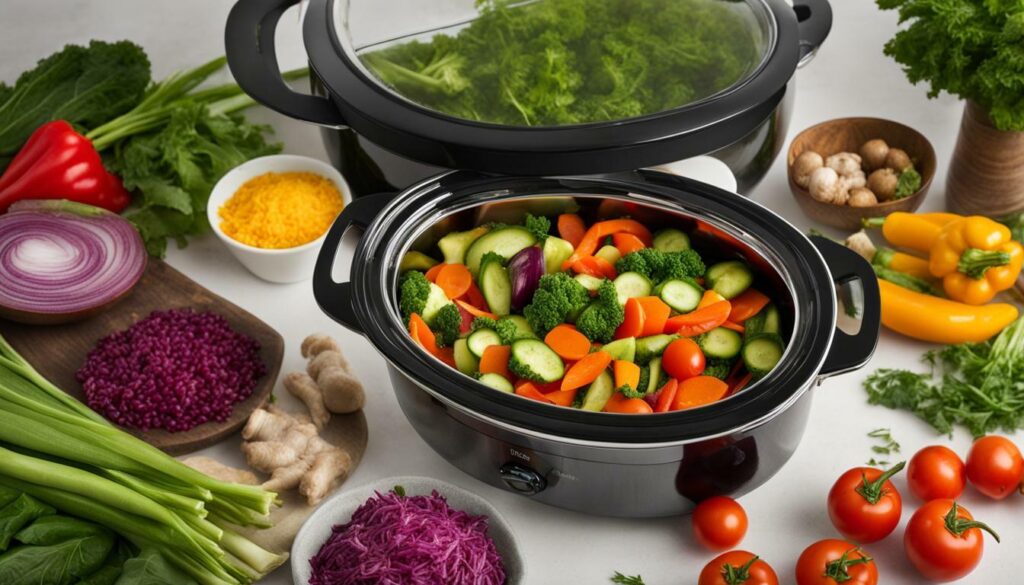
The Versatility of Slow Cookers
One of the greatest benefits of using a slow cooker is its versatility in the kitchen. From soups and stews to desserts and drinks, a small slow cooker can be used to prepare a wide variety of dishes.
One popular use for a slow cooker is for preparing hearty and comforting meals such as chili, pot roast, and beef stew. These dishes are perfect for cold winter days or when you want a satisfying meal without spending hours in the kitchen. Slow cooking allows the flavors to meld together for a delicious, savory taste.
But did you know that you can also use a slow cooker for desserts? Yes, you read that correctly! Slow cookers can be used to bake cakes, cook custards, and even make fruit compotes. The gentle, low-heat cooking process helps to create moist and flavorful desserts with minimal effort.
Another advantage of using a slow cooker is its convenience for preparing drinks. Mulled wine, cider, and hot chocolate are all easy to make in a slow cooker. The constant low heat ensures that the drink remains warm throughout your gathering.
Overall, the versatility of a small slow cooker makes it a valuable addition to any kitchen. Its ability to prepare a range of dishes with minimal effort allows you to save time and energy while still enjoying delicious homemade meals.
Conclusion: Embrace the Health Benefits of Slow Cooking
After exploring the numerous health benefits associated with using a small slow cooker in your kitchen, it’s clear that this appliance is a game-changer for anyone looking to improve their overall well-being.
When it comes to enhancing nutrition, slow cooking is second to none. The science behind nutrient retention during slow cooking ensures that your meals retain their essential vitamins and minerals, resulting in a healthier diet.
But that’s not all. Using a small slow cooker can also save you time, making it an ideal cooking method for busy individuals and families. Plus, slow cooking allows for the creation of hearty and nourishing meals, perfect for cold days or when you want a comforting dish.
Slow cooking can even support weight loss efforts by creating flavorful meals with less added fat or oil. And because slow cookers are energy-efficient, using one can help reduce your carbon footprint and save on utility bills.
To make the most of your slow cooker’s health benefits, be sure to choose the right ingredients and cooking techniques. Incorporating slow cooker meals into your meal planning routine can also save time, money, and effort while ensuring nutritious and delicious meals throughout the week.
Finally, it’s important to remember that slow cookers are incredibly versatile appliances that can be used to prepare a wide variety of dishes. So why not embrace the health benefits of slow cooking and expand your culinary repertoire?
Takeaway
Whether you’re looking to enhance your nutrition, save time, or enjoy hearty and nourishing meals, a small slow cooker is the perfect appliance for achieving your goals. So dust off your slow cooker and start reaping the many health benefits of this incredible kitchen tool!
FAQ
Q: What are the health benefits of cooking with a small slow cooker?
A: Cooking with a small slow cooker offers numerous health benefits, including enhanced nutrition, time-saving convenience, and the ability to create hearty and nourishing meals.
Q: How does slow cooking enhance nutrition?
A: Slow cooking is known for preserving the nutrient content of food better than other cooking methods. The low and consistent heat helps retain essential vitamins and minerals, resulting in healthier meals.
Q: Can a small slow cooker help me save time?
A: Absolutely! Using a small slow cooker can save you time in the kitchen. Simply set it and forget it, allowing you to go about your day while your meal cooks slowly and deliciously.
Q: What are the benefits of using a slow cooker for meal planning?
A: Incorporating a small slow cooker into your meal planning routine can save time, money, and effort. It allows you to prepare nutritious and delicious meals in advance, ensuring you have satisfying options throughout the week.
Q: Can slow cooking aid in weight loss?
A: Yes! Slow cooking supports weight loss by allowing you to create flavorful meals with less added fat or oil. It helps you maintain a healthy weight without sacrificing taste.
Q: Are slow cookers energy-efficient?
A: Slow cookers are known for their energy efficiency. They use less electricity compared to traditional stovetop or oven cooking methods, helping reduce your carbon footprint and save on utility bills.
Q: How can I maximize the health benefits of my slow cooker?
A: To maximize the nutritional value of your slow-cooked meals, choose fresh and nutrient-rich ingredients, avoid excessive use of processed or high-fat ingredients, and make use of optimal cooking techniques such as layering ingredients and adding herbs and spices for flavor.
Q: Can slow cooking help busy individuals maintain a balanced diet?
A: Yes! Slow cooking is a great solution for busy individuals as it allows you to have homemade, nutritious meals without spending hours in the kitchen. Simply set it up in the morning or before you leave for work, and return to a delicious meal in the evening.
Q: What makes slow cookers versatile?
A: Slow cookers are incredibly versatile appliances. They can be used to prepare a wide variety of dishes, including soups, stews, casseroles, desserts, and even drinks. The options are endless!
Q: What are the main health benefits of slow cooking?
A: Slow cooking offers enhanced nutrition, time-saving convenience, weight loss support, energy efficiency, and the ability to create a wide variety of delicious and nourishing meals.



